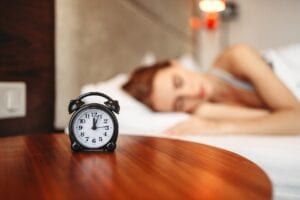While falling asleep seems like a natural thing, it is hard for at least one in three Americans. Read about the best natural sleep aids and put and end to your sleepless nights.
Insomnia is an all too common problem Americans face, making restful night sleep a battle instead of something comforting.
To fight this battle, a lot of people turn to prescription or over-the-counter medications.
According to Steven Winiarski, DO, of One Medical Group, “those drugs serve a purpose and they’re very effective for short-term insomnia.”
However, he added that “the problem is that they work so well that people forget what’s actually causing their insomnia.”
In other words, using these medications is like using a band-aid since insomnia may be a symptom of a larger problem.
Factors Affecting Sleep
If you have trouble sleeping at night, examine your sleep environment, daily habits, and any medical issues.
Make sure that your sleeping environment is dark, quiet, and gadget-free (don’t use smartphones in your sleep area).
Daily habits like exercise (or lack thereof), diet, and caffeine intake could also be affecting your sleep.
Finally, taking certain medications or suffering from medical conditions such as anxiety, sleep apnea, and thyroid trouble can lead to sleeplessness.
If you are doing everything right and you still can’t fall asleep or get a good night’s rest, then there are a couple of natural solutions you can try.
The following are some of the best natural sleep aids you can try instead of medications.
However, it’s important to remember that not all of them may work for you.
“Insomnia is multi-factorial,” said Winiarski. “Some remedies will be more effective than others depending on the reason – such as travel or anxiety – that you’re having trouble sleeping.”
 1. Melatonin
1. Melatonin
Basically, melatonin signals your body that it’s time to sleep.
However, things such as long travel may throw off your circadian rhythm.
Melatonin supplements are best for people who travel constantly or those who have varied sleeping schedules.
2. Valerian
This herb has been studied extensively, especially when it comes to its relaxant characteristics, but results are mixed.
It’s best for people who can’t sleep due to anxiety and stress, but keep in mind that its odor and taste are not pleasant.
3. Warm Drinks
One of the oldest remedies for insomnia is drinking a warm beverage like milk or non-caffeinated tea before bed.
While the scientific evidence behind this routine is lacking, Winiarski says we shouldn’t underestimate the power of a consistent bedtime ritual.
“If drinking tea helps you relax and unwind as part of your nightly routine, that can be helpful.”
—
As a pharmaceutical grade laboratory and nutraceutical manufacturer, Pharmatech specializes in providing high-quality nutraceutical manufacturing through its CGMP certified facility.




 1. Melatonin
1. Melatonin
Recent Comments